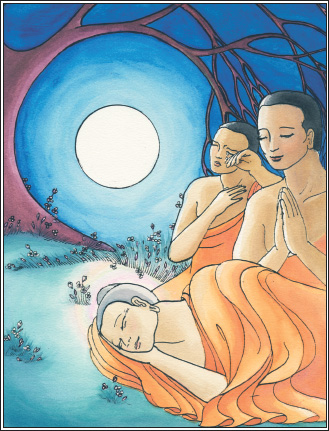
When Buddha was eighty years old he thought to himself, “I have done all I could to help others. I have taught them how to live with love and how not to fear anything in life. Now it is time to show them how to leave this world without fear.”
So he called the faithful Ananda to him and said, “Ananda, it is time for us to return to Kapilavastu for the last time. I wish to die in the city where I grew up.”
Ananda was grief stricken. “O Buddha,” he cried, “please do not leave us! For so many years you have been our guide. What shall we do without you?” Then he began to sob bitterly.
Buddha answered, “Do not cry, dear Ananda. I have always taught that death is a natural part of life. It is nothing to fear. You must understand that. And when I am gone, let my teachings be your guide. If you have understood them in your heart, you have no more need of me. Come, let us go.”
And so Buddha and his disciples traveled north. Not far from Kapilavastu they passed through the village of Kushinagar. The Buddha asked them to stop there and rest. Then he turned to Ananda and said, “This is where I shall pass away.”
Although this was to be the last day of his life, Buddha did not stop helping others. An old man from the village asked to see him, and Buddha agreed. He listened to the man’s problems and gave him kind words of advice. The man was put at ease and felt happy once again.
Then Buddha went out into the garden and lay down between two trees. His followers gathered around him. Some were crying, but others, their minds completely at peace, looked on silently.
Then Buddha spoke for the last time. “Remember what I have taught you. Craving and desire are the cause of all unhappiness. Everything sooner or later must change, so do not become attached to anything. Instead devote yourself to clearing your mind and finding true, lasting happiness.”
Buddha then turned onto his right side and placed his right hand under his head. He closed his eyes and very peacefully passed away. It was the full moon day of the fourth month.
After some time, his disciples took his body and placed it on a large pile of wood. They were going to burn it, as was the custom, but they could not get the fire to start. Then Buddha’s main disciple arrived. He had been away when Buddha died, and hurried to Kushinagar as soon as he found out about Buddha’s passing. After he arrived and paid his last respects to his teacher, the wood caught fire by itself. It burned for a long time, until nothing was left but some ashes and a few bones.

The different kings who lived in north India at the time all wanted the ashes and bones of the Buddha. They thought, “I shall build a monument to this great teacher in my kingdom, and place his remains inside it. This will bring me and my kingdom great honor.”
Since each of the kings wanted the remains, they soon began to quarrel. “They are mine,” said one. “No, they belong to me,” said another. Finally, a wise person said, “Buddha spent his entire life teaching us how to love one another. Now, after he has passed away, you foolish people are about to fight over his ashes. Fighting is against everything he ever taught us. So instead, let us divide up his remains equally. Then each of you can build a separate monument to him in your own kingdom.”
The kings realized the wisdom of these words, and stopped quarreling. They divided the ashes and bones of the Teacher among themselves and returned to their kingdoms. There they built monuments to the memory of one who taught and lived the path of peace and wisdom.